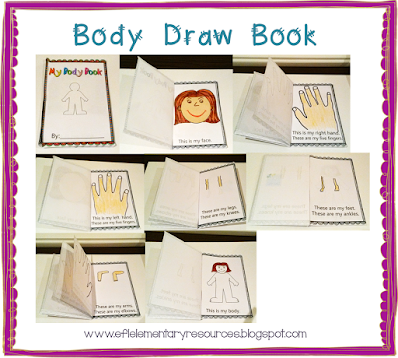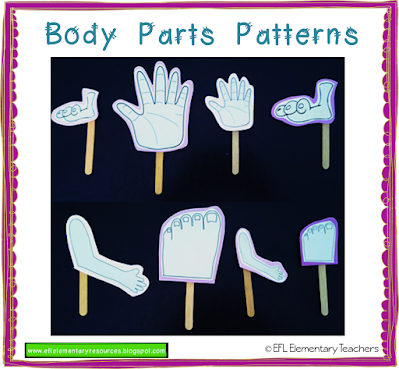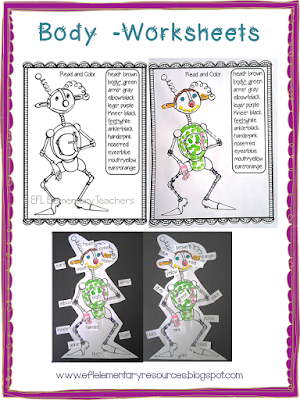Get the files for the parts of the body resource for teaching Elementary English Language Learners at my Bilingual Marketplace store:
https://www.bilingualmarketplace.com/products/body-theme-for-elementary-ell?variant=37172657979556
Watch the video of the resource:
Emotion,
play and surprising activities are the secret ingredients to learning. This resource is help students describe the parts of the body and to describe people, family members and later on even animals.
Body unit draw book: Let them recognize that
everybody in class is different.
Have the students draw their bodies as they read the sentences.
The grammar points are: possessive adjectives (This is my face) and demostratives (These are my legs)
Watch the video of the printable book:
To learn Body Words Board Activity 1: Draw several shapes as torsos on the board . Have
children come up to the complete the body.
Teacher: karla and
Paul, draw the head.
Continue with more body parts until the drawing is complete. Go over all
the body parts and label them. Then,
have children draw themselves with their complete bodies and label all their
body parts.
Board Activity 2: Divide the
class in several teams. Have a student from each team go to the board. Say a
body vocabulary word and have the students write it on the board as fast as
they can. Give a point to each team that
does it correctly. Continue with more words.
Children can count with their fingers. I printed onto cardboard a right and left hand. Then I glued all the
numbers onto clothespin. Students have to number all the fingers in the hand.
Adjectives Left and right related to the body: teach directionality during this unit. Have students
hold both hands in front of themselves. Use the hands and arrows available for
this purpose. You can make them smaller and paste the hands on their tables to
remind them of left and right. Have students say right hand and show it to you.
Do the same with left hand.
Pocket charts help children manipulate language in a special way. This
time I included the adjectives Big and small as a sorting body part activity. if you don´t have a pocket chart do it on a file folder, on the table or the board.
Or make puppets with the feet, hand,arms cutouts and make big and small body parts patterns.
Another version, using complete sentences or making sentences.
Make words: print letters onto different colored paper or construction
paper. Give students the letters to make body parts words as in a crossword.
Spelling: approach spelling as problem solving instead of a memorization
activity. Teach spelling strategies and skills. Here are some ideas.
Task cards: motivate students with these cards instead of a regular worksheet.
Students will have to deal with one question at a time instead of a whole page
in front of him/her. I create the task cards with all the grammar points in
mind and you can use the ones that suit your class. Use them to review before
tests. Students can work individually or in pairs. Save paper by printing and laminating the set. Students write on
their notebooks.
Worksheet:
there is no perfect worksheet for the body unit, but make changes to make it work. After I did the worksheet as in the instructions I cut everything out and created a label all activity by labelling the body parts and then the colors.
Body Unit Domino game benefits group learning experiences and reinforcement of the new language.
Body half game: print as many as you need. Give one half card to each
child and have them walk around finding their other match and stand together.
They can ask questions: Do you have the
arm ? Make it a speaking activity.

Tracing helps with :
-
Eye-hand development and use of the writing tools:
pencils, crayons, markers,etc
- fine motor skills
- Develops the awareness of key concepts of print in the
new language, even more when the language alphabet is completely different
-
teaches directionality about the ley movements for
letter and word formation
- The result is a neat worksheet or card that makes the
child like independent handwriting that has been lost for the excessive use of technology.
Students can show the card and say: This is an eye.
s
Picture and word matching: this kind of activity help
develop the word recognition skill necessary to reading. Students can see very
letter in each word in his own work area instead of looking at it on the board
that several meters away from him/her. Children need to focus on recognizing
words readily to move on to meaning.


























